
Beetles are insects that form the order Coleoptera, in the superorder Holometabola. Their front pair of wings are hardened into wing-cases, elytra, distinguishing them from most other insects. The Coleoptera, with about 400,000 described species, is the largest of all orders, constituting almost 40% of described insects and 25% of all known animal species; new species are discovered frequently, with estimates suggesting that there are between 0.9 and 2.1 million total species. Found in almost every habitat except the sea and the polar regions, they interact with their ecosystems in several ways: beetles often feed on plants and fungi, break down animal and plant debris, and eat other invertebrates. Some species are serious agricultural pests, such as the Colorado potato beetle, while others such as Coccinellidae eat aphids, scale insects, thrips, and other plant-sucking insects that damage crops.

Stag beetles are a family of about 1,200 species of beetles in the family Lucanidae, currently classified in four subfamilies. Some species grow to over 12 centimetres, but most to about 5 cm (2 in).
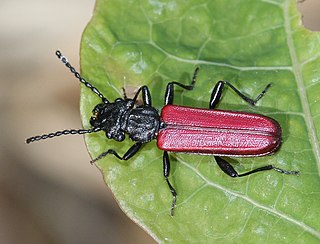
The Cucujidae, "flat bark beetles," are a family of distinctively flat beetles found worldwide under the bark of dead trees. The family has received considerable taxonomic attention in recent years and now consists of 70 species distributed in five genera. It was indicated Cucujus species are scavengers, only feeding on pupae and larvae of other insects and on other subcortical beetles such as their own. Since the Cucujidae prey on larvae of potentially tree damaging beetles that spread fungal diseases, they are considered to be beneficial to the health of living trees.

Dynastinae or rhinoceros beetles are a subfamily of the scarab beetle family (Scarabaeidae). Other common names – some for particular groups of rhinoceros beetles – include Hercules beetles, unicorn beetles or horn beetles. Over 1500 species and 225 genera of rhinoceros beetles are known.

The flea beetle is a small, jumping beetle of the leaf beetle family (Chrysomelidae), that makes up the tribe Alticini which is part of the subfamily Galerucinae. Historically the flea beetles were classified as their own subfamily.

Allomyrina dichotoma, also known as Japanese rhinoceros beetle, Japanese horned beetle, or kabutomushi, is a species of rhinoceros beetle.

Heteroceridae, the variegated mud-loving beetles, are a widespread and relatively common family of beetles found on every continent except for Antarctica.

Anomala is a genus of shining leaf chafers in the family of beetles known as Scarabaeidae. There are at least 1,200 described species in Anomala.
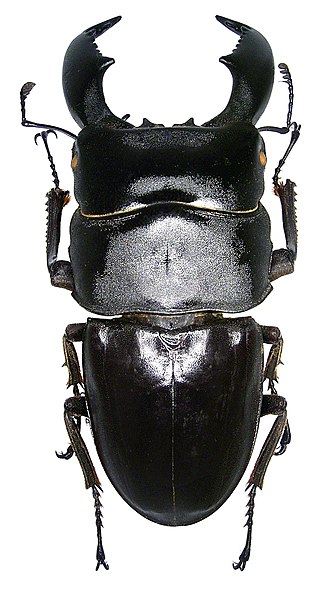
Dorcus titanus is a beetle of the family Lucanidae. It was described by Jean Baptiste Boisduval in 1835. Huang and Chen (2013) separated Serognathus from Dorcus by representing morphological characters and DNA analysis.

Rana longicrus, also known as the Taipa frog or long-legged brown frog, is a species of frog in the family Ranidae. It is distributed to northern and central Taiwan.

Buergeria is a genus of frogs in the family Rhacophoridae, and the sole genus of subfamily Buergeriinae. They are the sister taxon for all the other rhacophorids. The available firmly supports this position.

The Ryukyu Kajika frog, Japanese Buerger's frog, or Japanese stream treefrog is a species of frog in the family Rhacophoridae. It is found in the Ryukyu Islands (Japan). Populations from northern Taiwan and the Yaeyama Islands were isolated as a new species(Buergeria choui) in 2020.

Gryllotalpa is a genus of insects in the mole cricket family Gryllotalpidae.

Cyclommatus is a genus of the family Lucanidae, also known as the stag beetle. The majority of the species from the genus Cyclommatus are located in Southeast Asia, though some species are found in China and Taiwan as well. The genus Cyclommatus also consists of three subgenera: Cyclommatus, Cyclommatinus and Cyclommatellus. Each subgenera contains 80, 24 and 3 species respectively. In total, the genus Cyclommatus consists of a total of 134 species, though more are still being discovered to this day.

Pristionchus is a genus of nematodes (roundworms) in the family Diplogastridae that currently includes more than 50 described species. They are known mainly as non-parasitic associates of insects, especially beetles, while others have been reported from soil, organic matter, or rotting wood. The genus includes P. pacificus, a satellite model organism to the well-studied nematode Caenorhabditis elegans.
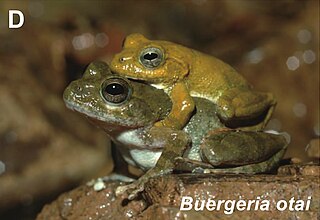
Buergeria otai is a species of frogs in the family Rhacophoridae. It is endemic to Taiwan and found in the eastern and southern parts of the island. Buergeria choui, with whom Buergeria otai was confused before described as a distinct species in 2017, occurs in northwestern Taiwan. The two species have only a narrow contact zone and can be distinguished based on genetic markers, calls, and morphology.
Lucanus datunensis is a species of stag beetle endemic to Tatun Mountain of Taiwan's Yangmingshan.It is first discovered in 1984. It is the smallest stag beetle in Taiwan and is an endangered species threatened by recent human activity.
Arthromelodes is a genus of beetle belonging to the rove beetle family.
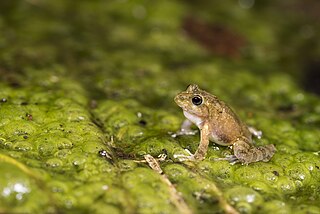
Buergeria choui is a species of frog in the family Rhacophoridae. Prior to its description in 2020, it was confused with Buergeria japonica. It is found in northwestern Taiwan and in the southern part of the Ryukyu Archipelago, Japan, specifically on the Yaeyama Islands. Common name Yaeyama Kajika frog has been proposed for it. The specific name choui honors Wen-Hao Chou from the National Museum of Natural Science (Taiwan), the first person to pay attention to the variation within the former Buergeria japonica.
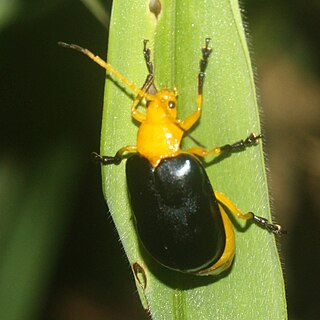
Agetocera is a genus of skeletonizing leaf beetles in the family Chrysomelidae. There are more than 25 described species in Agetocera. They are found in Indomalaya and the Palaearctic, especially in China.

















